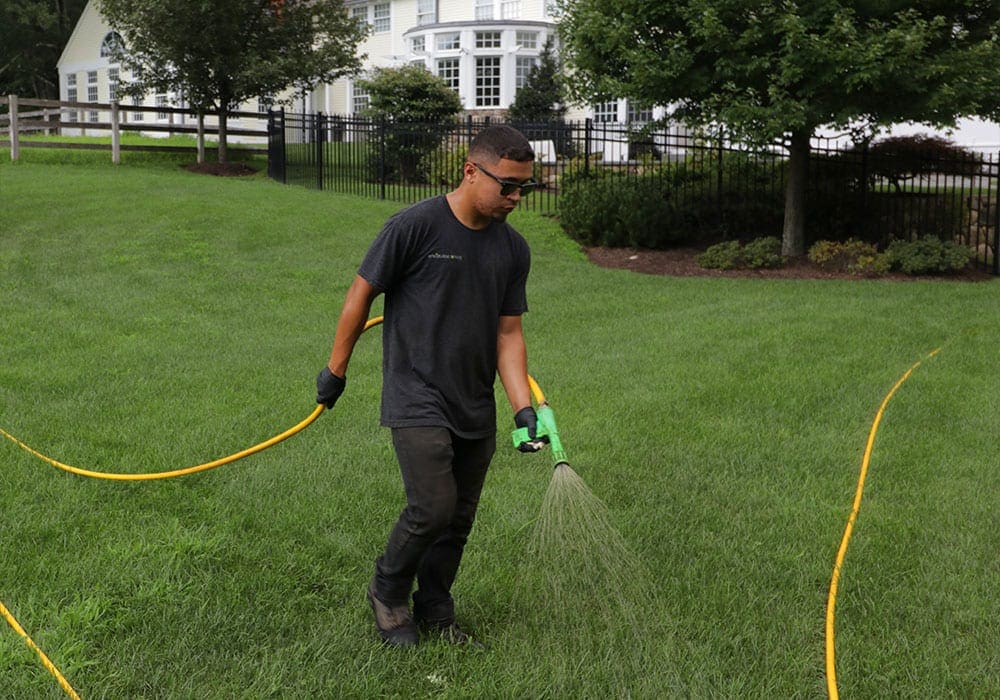For Greener Grass & Safer Lawns: Use Natural Fertilizers
Organic Fertilizer Service
Greener & safer grass without harsh synthetic fertilizers or chemical herbicides
Cool-season turfgrass requires more inputs than nature can provide, which is why we supplement with organic slow-release fertilizers. We custom blend our fertilizers with the proper nutrients, but also include microbial and beneficial organisms, which are necessary to maintain a healthy soil life, and transfer nutrients to your grass.
We may apply a granular or a liquid to the lawn, depending on the needs of the soil and the time of the season we are in. Unlike a conventional fertilizer program that is dependent on water, organic fertilizers break down with active soil biology, and build it up over time, making it more resiliant and naturally healthy.

Benefits of Organic Lawn Fertilizers
View Benefits
- Organic fertilizer delivers nutrients to the soils of your lawn, creating a program that focuses on lawn health and not plant health.
- The organic matter stays in the soil and breaks down to help improve soil structure. Promoting a sustainable, healthy natural lawn for years to come.
- Organic fertilizer encourages the presence of beneficial microbes whose job it is to break down organic matter into chemicals that roots can absorb.
- Our fertilizers pose limited contact risks for our technicians, children and pets.
- Nutrients don’t run off or leach into the groundwater, causing harm to our natural waterways and aquifers.

Dangers of Chemical Fertilizers
View Dangers
- Of 30 commonly used lawn pesticides 13 are probable or possible carcinogens, 13 are linked with birth defects, 21 with reproductive effects, 15 with neurotoxicity, 26 with liver or kidney damage, 27 are sensitizers and/or irritants, and 11 have the potential to disrupt the endocrine (hormonal) system.
- Children ages 6-11 have higher levels of lawn chemicals in their blood than all other age categories.
- Of 30 commonly used lawn pesticides: 16 are toxic to birds, 24 are toxic to fish and aquatic organisms, and 11 are deadly to bees.
- Runoff from synthetic chemical fertilizers pollutes streams and lakes and causes algae blooms, depleted oxygen and damage to aquatic life.
Differences in the Performance of Organic vs. Traditional Lawn Fertilizers
Because most people have experience with traditional chemical fertilizers it is good to know how an organic fertilizer performs. Typically an organic fertilizer is a bit more expensive however, over time it requires much less maintenance, and most clients see some cost savings after a healthy natural green lawn is established.
This won’t artificially green your lawn in one week like some chemical fertilizers claim their products do. Organic fertilizers take time to feed the soil and establish a healthy environment where your lawn can flourish, but work better in the long run. With patience and understanding, organic fertilizers will not only create a lush, green beautiful lawn but they will also give you peace of mind knowing you are no longer dumping toxic chemicals onto your property.

The Pure Solutions Organic Lawn Fertilizers Program
An important component of our organic lawn care services is our fertilizer service. To ensure a natural, healthy, lush green yard you can expect the following:
- We first conduct a soil test to structure our fertilizer program to meet the nutrient needs of your lawn.
- We apply our proprietary organic fertilizer up to 5 times each season. This includes a mix of both natural liquid fertilizer and organic granular fertilizer applications.
- These treatments are performed between April-November, as part of our organic lawn care services. We use fertilizers that are optimal for the time of year.
- After an application of our fertilizer, we recommend waiting an hour before recreating on the lawn/property, this gives the product time to fully settle.
- If possible it’s best to apply fertilizer after mowing
- Our natural organic lawn fertilizer will have low NPK (nitrogen, phosphorus, potassium) numbers, always below 10.
- Watering recommendations click here
- We use commercial ride-on spreaders/sprayers that are accurate, efficient and speed up application time
- Our organic fertilizers perform incredibly well when combined with our organic compost topdressing
Why You Should Make the Switch
- Every year millions of pounds of harmful, toxic pesticides are used across the United States on home lawns.
- According to the EPA, traditional lawn chemicals can put children and pets at risk.
- Healthy Organic lawns can help offset climate change by sequestering carbon dioxide.
- Organic lawns use less water.
- No leaching of chemicals into valuable drinking resources.
- Organic lawns are more stress tolerant.

Get a Digital Quote Today!
Frequently Asked Questions
When to fertilize a lawn?
The best time to fertilize your lawn depends on various factors such as the climate, grass type, and the specific nutrients needed. As a general rule, it's best to fertilize your lawn when the grass is actively growing. For cool-season grasses, this typically means fertilizing in the fall and spring when temperatures are cooler. Warm-season grasses, on the other hand, should be fertilized during their active growing season in late spring or early summer. It's important to follow the instructions on the fertilizer packaging carefully and avoid over-fertilizing, which can lead to lawn damage and environmental pollution. It's also recommended to fertilize after aerating or dethatching your lawn, as this can help the nutrients reach the roots more effectively.
How to fertilize a lawn?
To fertilize a lawn spread a high-quality lawn fertilizer that contains the necessary nutrients, typically nitrogen, and potassium. Spread the fertilizer evenly over the lawn, either by hand or with a spreader. Water the lawn immediately after applying the fertilizer to help the nutrients reach the roots.
How often should you fertilize your lawn?
Fertilizing your lawn five times with an organic lawn care program can provide numerous benefits for your lawn's health and appearance. Organic fertilizers, which are derived from natural sources such as plant and animal byproducts, can gradually release nutrients into the soil and promote healthier root systems. By fertilizing five times throughout the year, you can ensure that your lawn receives a consistent supply of nutrients throughout the growing season. This can lead to a more vibrant, thicker, and greener lawn that is better able to withstand stress from pests, disease, and weather conditions. Additionally, organic fertilizers are generally safer for pets, children, and the environment, as they are less likely to contain harmful chemicals or synthetic compounds.
When should you fertilize your lawn?
The ideal time to fertilize your lawn will depend on the type of grass you have and the climate in your area. In general, the best time to fertilize cool-season grasses, such as Kentucky bluegrass, fescue, and ryegrass, is in early spring and again in the fall. For warm-season grasses, such as Bermuda grass, zoysia grass, and St. Augustine grass, it's best to fertilize during the summer months when they are actively growing. It's important not to fertilize your lawn too early in the spring when the ground is still frozen or too late in the fall when the grass has gone dormant. Over-fertilizing can also damage your lawn, so be sure to follow the manufacturer's instructions and apply the recommended amount.
Should grass be cut before fertilizing?
It is generally recommended to cut the grass before fertilizing, as this can help the fertilizer to reach the soil more effectively. When grass is long, the fertilizer can get caught in the blades and may not reach the soil where it is needed. Cutting the grass to a shorter length can also help to stimulate growth and allow for more even distribution of the fertilizer. Additionally, when grass is cut, the clippings can be left on the lawn to decompose and provide natural nutrients to the soil, which can complement the effects of the fertilizer. Overall, while there is no hard and fast rule, it is generally a good idea to cut the grass before fertilizing to ensure the best possible results.
Does fertilizer thicken grass?
The application of fertilizer can have a positive impact on the growth and thickness of grass. Fertilizers provide essential nutrients such as nitrogen, phosphorus, and potassium, which are necessary for the healthy development of plants. These nutrients help to promote strong root growth and increase the density of foliage, which can result in thicker, lusher grass. However, it's important to note that excessive use of fertilizer can have negative effects on grass, such as burning or yellowing of the foliage, and can also harm the surrounding environment. Therefore, it's essential to follow the recommended guidelines for fertilization and to use the appropriate type of fertilizer for the specific type of grass being grown.
Are Chemical Fertilizers & Pesticides Harmful to My Lawn?
There have been numerous studies on the dangerous effects of lawn chemicals and the negative impact they have on the environment, and potentially children and pets as well. Lawn products can also be tracked in the house and get into the carpets and floors, while improper applications of fertilizers can run off into local ponds, or leach into groundwater, destroying our beautiful New England natural habitats.

